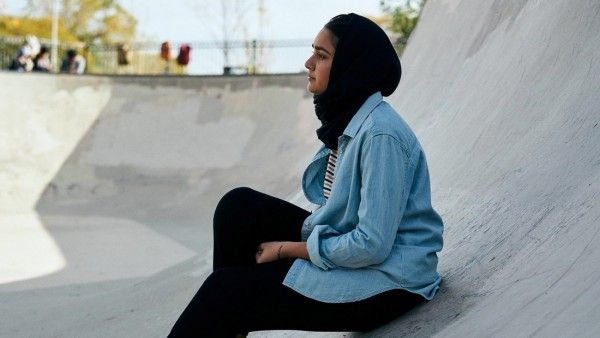I like the idea of Hala more than I actually like Hala. Minhal Baig’s coming-of-age story starts at a strong point by following a teenage Muslim girl in America discovering her sexuality and sense of identity, but the script never fully fleshes out the characters or the story. Instead, Hala always remains stuck at the idea phase, never bringing the characters to life. Although the film features a strong lead performance from Geraldine Viswanathan, Hala feels at least several drafts away from fully realizing its potential.
Hala (Viswanathan) is a senior in high school, a talented writer who enjoys skateboarding, and tries to be a well-behaved young Muslim woman for her mother (Purbi Joshi) and father (Azad Khan). However, Hala begins to strain against her upbringing and falls for her white classmate Jesse (Jack Kilmer), who also shares Hala’s love of poetry and writing. Hala’s life becomes even more complicated when, while on a date with Jesse, she discovers that her father is having an affair. Scared that she’ll end up in a loveless marriage, but also unable to turn her back on her family, Hala’s life begins to spiral out of control.
What I liked most about Hala and what I wish it did more was simply let me into Hala’s life and show me what it’s like to be a Muslim teenager in the present day. It’s a culture and upbringing I wanted to understand better, but in Hala, there’s never enough texture or nuance to her life. Hala’s room is barely decorated, and I didn’t know if that was because of her upbringing or if that was the character’s decision. I know Hala likes skateboarding, is good at writing, and has friends, but in Baig’s hands, these feel like traits in search of a personality. I spent an entire film following Hala, and I know what she does and what she wants, and yet I still don’t feel like I know who she is. Is she funny? Is she shy? How much freedom does she have to define her interests and how much of her life is constrained by her parents? I wanted to know more, and yet Hala focuses on the conflict while missing the character.
Hala rarely offers specificity, so it’s hard to track why certain characters, particularly Hala’s parents, behave a certain way. At the start of the film, Hala’s mother is fairly strict with her daughter. She chastises Hala for missing her morning prayers and only speaks Urdu, showing that she and her daughter are literally and figuratively speaking different languages. Meanwhile, Hala gets along famously with her father as they do crossword puzzles together. And then, halfway through the movie, the parents’ personalities switch. Suddenly, her mother is warm, nurturing, and willing to let her daughter be her own person while her father is incredibly cold and unforgiving. Nothing happens to explain this change. The characters simply do a 180 because the plot requires them to.
That’s a shame because Viswanathan gives her all playing Hala. She’s emotionally vulnerable, knows how to hold a scene without stealing focus, and does her best to play to the emotional truth of the character even though the film constantly avoids that truth with clichés like the teenager who discovers their beloved parent is having an affair (I’m pretty sure I’ve seen this particular trope at least once at every Sundance I’ve been to for the past nine years). There’s plenty of dramatic material that’s inherent in Hala’s story, but the script never feels like it finds the honest voice of a teenager so Viswanathan’s performance is constantly running up against a character who feels two-dimensional.
We need movies like Hala that show us the lives of people who don’t normally get to take center stage in movies. I’ve seen plenty of coming-of-age dramas, but never one before where the lead character was a young Muslim woman. But instead of offering something unique and lived-in, Baig’s movie always keeps us at a distance, refusing to give us unpredictability or characters that seem believable. Hala’s story is worth telling, but it needed to be told far better.
Rating: C-
Hala does not currently have a release date.


